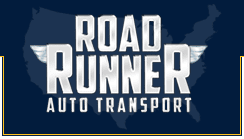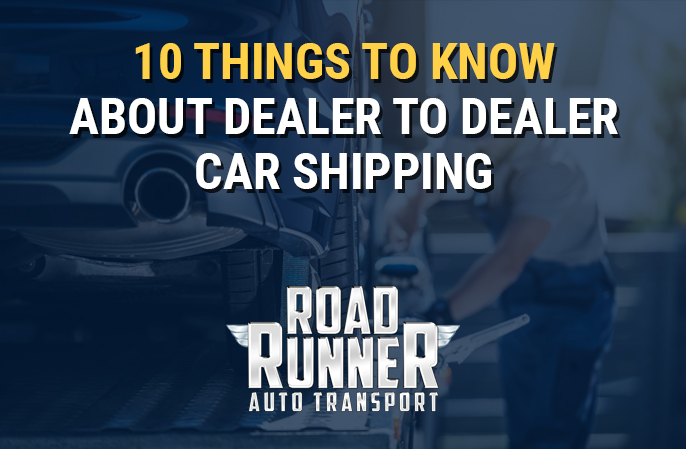
The trusted name in vehicle shipping for over 30 years!
- Track a Shipment
- Dealer Login
- Carrier Login
Speak with a shipping expert
(888) 777-2123

10 Things to Know About Dealer to Dealer Shipping
Posted on 01/21/2025

In a dynamic automotive market, efficient dealer-to-dealer vehicle transport is essential for inventory management and sales optimization. Whether you’re a small independent dealership or part of a large automotive group, understanding the key aspects of dealer-to-dealer shipping can significantly impact your business operations and bottom line.
Dealer-to-Dealer Transportation Basics
1. What is Dealer-to-Dealer Auto Transport?
Dealer-to-dealer auto transport involves the professional relocation of vehicles between automotive dealerships, auction houses, and distribution centers. This specialized service facilitates inventory management, allows dealers to access vehicles from distant markets, and enables efficient trade between dealership locations. Professional car shipping companies handle the entire logistics process, from pickup to delivery, ensuring vehicles arrive safely and on schedule.
Check out our car buying guide for 2025.
2. The Benefits of Dealer-to-Dealer Car Shipping
Dealer-to-dealer auto transport services offer many advantages for automotive businesses. Working with an experienced car shipping company allows dealerships to expand their market reach beyond local boundaries, access a wider variety of inventory, and fulfill specific customer requests more effectively. Additionally, professional shipping services eliminate the need for dealer staff to spend time driving vehicles between locations, reducing labor costs and allowing employees to focus on sales and customer service.
Key Factors in Dealer Vehicle Transport
3. Shipping Costs and Pricing Structures
The cost of dealer-to-dealer auto transport services depends on several factors, including distance, vehicle type, transport method, and timing. Most auto transport companies calculate rates based on a per-mile basis, with prices typically ranging from $0.70 to $1.50 per mile depending on the service level chosen. Volume discounts are often available for dealers shipping multiple vehicles regularly, and establishing a long-term relationship with a reliable transport company can lead to preferential pricing and priority scheduling.
Explore the best ways to tow a car long distance.
4. Transport Service Options
Dealers can choose between several transport methods to meet their specific needs. Open car transport offers the most economical option and is suitable for most standard vehicles, while enclosed auto transport provides additional protection for high-value or luxury vehicles. Expedited shipping services ensure faster delivery when time is critical, and door-to-door service eliminates the need for additional vehicle movement between terminals.
Essential Shipping Considerations
5. Documentation and Paperwork Requirements
Proper documentation is key for smooth auto transport services. Required paperwork typically includes the bill of lading, vehicle inspection reports, and proof of insurance. Digital documentation systems streamline the car shipping process, allowing dealers to manage paperwork efficiently and maintain accurate records of all shipments.
6. Pickup and Delivery Procedures
Professional auto transport companies handle all aspects of vehicle pickup and delivery, including thorough inspections at both origin and destination. Carriers coordinate directly with dealership staff to ensure convenient scheduling and seamless loading/unloading processes. Advanced notification systems keep dealers informed of estimated arrival times, allowing for proper preparation and staffing.
7. Transit Times and Scheduling
Transit times vary based on distance and route, with most shipments completed within 3-14 days, depending on the specifics of the transport. Seasonal factors and weather conditions can impact transit times, making advance planning essential for time-sensitive shipments. Experienced auto transport companies provide realistic delivery estimates and maintain consistent communication throughout the car shipping process.
Legal and Insurance Aspects
8. Official Transport Regulations
Federal regulations mandate that the total gross vehicle weight (including the truck, trailer, and all loaded vehicles) cannot exceed 80,000 pounds on interstate highways, with specific axle weight distributions: 20,000 pounds on single axle and 34,000 pounds on double axle trailers. Individual states may enforce various weight limits on state roads, requiring auto carriers to carefully plan routes and load distributions.
9. Liability Coverage and Protection
Most auto carriers provide primary liability coverage and cargo insurance for car shipping. Additional coverage options may be available for high-value vehicles or specialized inventory. Understanding insurance terms and coverage limits helps dealers make informed decisions about protection levels for their shipments.
10. Contract Terms and Agreements
Clear contract terms establish responsibilities and expectations for both parties. Auto transport companies should provide detailed service agreements covering pricing, scheduling, insurance, and dispute resolution procedures. Having a clear understanding of these terms helps dealers protect their interests and maintain productive relationships with their transport partners.
Best Practices for Successful Transport
Vehicle Inspection Guidelines
Thorough vehicle inspections before and after transport protect both dealers and carriers. Detailed documentation of vehicle condition, including photographs and written reports, prevents disputes and ensures proper handling of any damage claims. Reputable car shipping companies provide standardized inspection procedures and documentation forms.
Communication Protocols
Effective communication between dealers and transport providers ensures smooth operations. Regular updates on shipment status, prompt notification of any delays or issues, and clear channels for problem resolution contribute to successful transport relationships.
Tracking and Monitoring Shipments
Modern transport companies provide advanced tracking systems, allowing dealers to monitor their shipments in real time. GPS tracking, automated status updates, and electronic delivery confirmation streamline the car shipping process and provide peace of mind for valuable inventory in transit.
Choose RoadRunner for Reliable Car Dealer Shipping
RoadRunner Auto Transport offers comprehensive dealer-to-dealer car shipping services backed by over 30 years of industry experience. Our nationwide network of carriers, advanced tracking systems, and dedicated support team ensure reliable, efficient vehicle transport for dealerships of all sizes. Contact us today to learn how our expertise can benefit your dealership’s transport needs.
Frequently Asked Questions
How long does dealer-to-dealer shipping typically take?
Most dealer-to-dealer shipments can be completed within 3-14 days, depending on distance and route. Expedited shipping options are available for time-sensitive deliveries.
What insurance coverage is provided during transport?
Standard coverage includes primary liability and cargo insurance, with additional coverage options available for high-value vehicles.
Can multiple vehicles be shipped simultaneously?
Yes, open carriers can transport up to 10 vehicles at once, while enclosed carriers typically accommodate 2-6 vehicles, making multi-vehicle shipments efficient and cost-effective.
What documentation is required for dealer-to-dealer shipping?
Essential documentation includes the bill of lading, vehicle inspection reports, proof of insurance, and any relevant dealer transfer paperwork. Our team assists in ensuring all necessary documentation is properly completed.
Instant Car Shipping Quote
Calculate your car shipping rate in 3 easy steps!
10 Things to Know About Dealer to Dealer Shipping
Posted on 01/21/2025

In a dynamic automotive market, efficient dealer-to-dealer vehicle transport is essential for inventory management and sales optimization. Whether you’re a small independent dealership or part of a large automotive group, understanding the key aspects of dealer-to-dealer shipping can significantly impact your business operations and bottom line.
Dealer-to-Dealer Transportation Basics
1. What is Dealer-to-Dealer Auto Transport?
Dealer-to-dealer auto transport involves the professional relocation of vehicles between automotive dealerships, auction houses, and distribution centers. This specialized service facilitates inventory management, allows dealers to access vehicles from distant markets, and enables efficient trade between dealership locations. Professional car shipping companies handle the entire logistics process, from pickup to delivery, ensuring vehicles arrive safely and on schedule.
Check out our car buying guide for 2025.
2. The Benefits of Dealer-to-Dealer Car Shipping
Dealer-to-dealer auto transport services offer many advantages for automotive businesses. Working with an experienced car shipping company allows dealerships to expand their market reach beyond local boundaries, access a wider variety of inventory, and fulfill specific customer requests more effectively. Additionally, professional shipping services eliminate the need for dealer staff to spend time driving vehicles between locations, reducing labor costs and allowing employees to focus on sales and customer service.
Key Factors in Dealer Vehicle Transport
3. Shipping Costs and Pricing Structures
The cost of dealer-to-dealer auto transport services depends on several factors, including distance, vehicle type, transport method, and timing. Most auto transport companies calculate rates based on a per-mile basis, with prices typically ranging from $0.70 to $1.50 per mile depending on the service level chosen. Volume discounts are often available for dealers shipping multiple vehicles regularly, and establishing a long-term relationship with a reliable transport company can lead to preferential pricing and priority scheduling.
Explore the best ways to tow a car long distance.
4. Transport Service Options
Dealers can choose between several transport methods to meet their specific needs. Open car transport offers the most economical option and is suitable for most standard vehicles, while enclosed auto transport provides additional protection for high-value or luxury vehicles. Expedited shipping services ensure faster delivery when time is critical, and door-to-door service eliminates the need for additional vehicle movement between terminals.
Essential Shipping Considerations
5. Documentation and Paperwork Requirements
Proper documentation is key for smooth auto transport services. Required paperwork typically includes the bill of lading, vehicle inspection reports, and proof of insurance. Digital documentation systems streamline the car shipping process, allowing dealers to manage paperwork efficiently and maintain accurate records of all shipments.
6. Pickup and Delivery Procedures
Professional auto transport companies handle all aspects of vehicle pickup and delivery, including thorough inspections at both origin and destination. Carriers coordinate directly with dealership staff to ensure convenient scheduling and seamless loading/unloading processes. Advanced notification systems keep dealers informed of estimated arrival times, allowing for proper preparation and staffing.
7. Transit Times and Scheduling
Transit times vary based on distance and route, with most shipments completed within 3-14 days, depending on the specifics of the transport. Seasonal factors and weather conditions can impact transit times, making advance planning essential for time-sensitive shipments. Experienced auto transport companies provide realistic delivery estimates and maintain consistent communication throughout the car shipping process.
Legal and Insurance Aspects
8. Official Transport Regulations
Federal regulations mandate that the total gross vehicle weight (including the truck, trailer, and all loaded vehicles) cannot exceed 80,000 pounds on interstate highways, with specific axle weight distributions: 20,000 pounds on single axle and 34,000 pounds on double axle trailers. Individual states may enforce various weight limits on state roads, requiring auto carriers to carefully plan routes and load distributions.
9. Liability Coverage and Protection
Most auto carriers provide primary liability coverage and cargo insurance for car shipping. Additional coverage options may be available for high-value vehicles or specialized inventory. Understanding insurance terms and coverage limits helps dealers make informed decisions about protection levels for their shipments.
10. Contract Terms and Agreements
Clear contract terms establish responsibilities and expectations for both parties. Auto transport companies should provide detailed service agreements covering pricing, scheduling, insurance, and dispute resolution procedures. Having a clear understanding of these terms helps dealers protect their interests and maintain productive relationships with their transport partners.
Best Practices for Successful Transport
Vehicle Inspection Guidelines
Thorough vehicle inspections before and after transport protect both dealers and carriers. Detailed documentation of vehicle condition, including photographs and written reports, prevents disputes and ensures proper handling of any damage claims. Reputable car shipping companies provide standardized inspection procedures and documentation forms.
Communication Protocols
Effective communication between dealers and transport providers ensures smooth operations. Regular updates on shipment status, prompt notification of any delays or issues, and clear channels for problem resolution contribute to successful transport relationships.
Tracking and Monitoring Shipments
Modern transport companies provide advanced tracking systems, allowing dealers to monitor their shipments in real time. GPS tracking, automated status updates, and electronic delivery confirmation streamline the car shipping process and provide peace of mind for valuable inventory in transit.
Choose RoadRunner for Reliable Car Dealer Shipping
RoadRunner Auto Transport offers comprehensive dealer-to-dealer car shipping services backed by over 30 years of industry experience. Our nationwide network of carriers, advanced tracking systems, and dedicated support team ensure reliable, efficient vehicle transport for dealerships of all sizes. Contact us today to learn how our expertise can benefit your dealership’s transport needs.
Frequently Asked Questions
How long does dealer-to-dealer shipping typically take?
Most dealer-to-dealer shipments can be completed within 3-14 days, depending on distance and route. Expedited shipping options are available for time-sensitive deliveries.
What insurance coverage is provided during transport?
Standard coverage includes primary liability and cargo insurance, with additional coverage options available for high-value vehicles.
Can multiple vehicles be shipped simultaneously?
Yes, open carriers can transport up to 10 vehicles at once, while enclosed carriers typically accommodate 2-6 vehicles, making multi-vehicle shipments efficient and cost-effective.
What documentation is required for dealer-to-dealer shipping?
Essential documentation includes the bill of lading, vehicle inspection reports, proof of insurance, and any relevant dealer transfer paperwork. Our team assists in ensuring all necessary documentation is properly completed.
"You can trust this company to provide excellent service and set your mind at ease with the delivery of your vehicle."
Trish A.
Miami, FL


"Very easy to book and great with answering my questions. The shipping agent I spoke with was very friendly and helpful."
Susan K.
Dallas, TX


"Everything with RoadRunner went smooth and seamless. They gave me a great rate and provided excellent service!"
Owen A.
Hartford, CT


"I couldn't have been happier with the service provided by RoadRunner to transport my car from CA to NY"
Deborah B.
Long Beach, CA


Frequently Asked Questions
Get answers to some of the most commonly asked questions about the vehicle transportation process.








